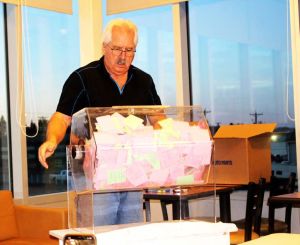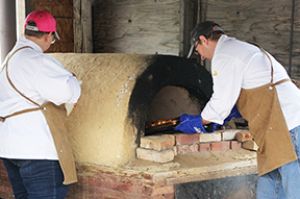Mykula and Kujanpaa reign supreme in Festival
The Munro Smashball League continued their season schedule by hosting Festival Du Spikageur in Legion Park on June 23, where eight teams battled for the ultimate prize in the second tournament of season four.
With original partners absent, some players were playing with teammates they have never played with before. The least surprising of the bunch, was Will Munro moving on from ex-partner Kash Henkelman, replacing him with Andrew Pidskalny, making it his fourth new partner in a span of the last two seasons. Another shocker was the brother duo Kieran and Aidan Maksymchuk teaming up, due to the usually heated rivalry between the siblings.
Round Robin got underway with a ton of upsets, for example, heavyweight contenders Tyan Mykula and Ali Kujanpaa were knocked off the rails after a hot 3-0 start by the sibling duo of Alex and Hannah Campbell, falling 11-2 in a match that seemed like the shortest in Munro Smashball history, or when Munro and Pidskalny were defeated by Mykula and Kujanpaa. The round-robin ended with a four-way tie for last, in which the teams collaborated for about 10 minutes before making a decision on how to figure things out, but once they found out, playoffs were well underway.
Ethan Campbell and Chad Brightnose finished in first, facing the eight-seeded Nate Immerkar and Wyatt Rose; Mykula and Kujanpaa finished second and faced the Campbells; Munro and Pidskalny faced the Maksymchuk brothers; while the Eisners faced off against Rylee Cockburn and Jada Kujanpaa.
The playoffs got well underway with teams ready to put their bodies on the line. The higher seeds all took care of their matchups with some struggle but not like Munro and Pidskalny faced with the Maksymchuk duo. They battled to the end and held the lead at one point against the heavily favoured Golden Arrows, but Munro and Pidskalny pulled through to move on, facing up against former teammate of Munro’s, Tyan Mykula and his partner Ali Kujanpaa, while the Boombastics faced the Eisner Brothers.
The semi-finals got hot underway and left no shortage of controversy, while the Campbell, Brightnose and Eisners matchup was civil, the Mykula versus Munro battle was one for the ages. A ton of arguing and controversial calls went through the game but Mykula beat his former teammate in all fairness, after an apparent missed call happened on the field.
Leading to some fresh new faces in the finals, with the matchup being Mykula and Kujanpaa, versus the Eisner brothers. A final that had spectators happy with some new competitors rather than having a Munro win once again. The finals were an absolute dogfight, with both teams having their ups and downs while competing. But the duo of Mykula and Kujanpaa came out on top.
Next up on the schedule for Munro Smashball is the Spike Series in July 16 in Legion Park.
Swan River U11 Royals Teams tough it out at Provincials
Swan River has achieved success when it comes to connecting youth with the desire to play baseball. The Swan River U11 Blue and Grey Royals Teams worked hard all season to Provincials on June 22.
“Both Swan River teams had a very successful regular season with the Blue Royals at 5-2 and the Grey Royals at 4-3,” said Swan River U11 Blue Royals Head Coach Aaron Goethe. “The baseball season is short, but it’s amazing to see how the kid’s knowledge of the game and skills progress in only a couple of months.
“We even had several kids in the gym in April learning how to pitch. With the current pitch count regulations from Baseball Manitoba, you need a lot of players with the ability to pitch just to get through a tournament weekend.”
The weather has been less than cooperative for almost any league to play in Provincials. The wind gusts and rain led to the U11 Provincials having to be stretched out over the week, rather than the weekend.
“Unfortunately, the weather did impact the games on the weekend,” said Goethe. “The rain held off on Friday night and we were able to play, however, all the games were cancelled on Saturday due to rain, delaying the schedule. Saturday games were pushed to Sunday, and the Sunday semis and finals were pushed to Monday, Tuesday and Wednesday.
“The teams were excited going into regionals, looking forward to playing against teams that they hadn’t faced all year. The Blue Royals’ first game was against an undefeated Dauphin Cargill team. The kids played really well that game and were able to keep the game close until the fifth inning when Dauphin scored four runs, eventually winning the game 6-1. Our pitching and defence kept us in the game against Cargill, some of the best efforts we had seen from the kids this year.
“Our second game was against the Grey Royals, which was unfortunate because you hope to play teams outside of your division, it’s even worse when you’re playing your buddies from your hometown. It was an offensive battle, however the Blue Royals ended up with the win 22-8.
“The last game in our pool was against Dauphin Eastside, which all of our coaches agreed was the most memorable game of the entire season,” said Goethe. “We were able to hold the lead for most of the game until Dauphin made a late charge in the top of the sixth inning to tie the game 6-6. Jacob Sigurdson did a fantastic job on the mound shutting down the Dauphin bats and ending their late rally.
“In the bottom of the sixth, Carter Rosteski and Beckett Anderson were able to make their way onto the bases and would eventually put themselves into scoring position for Lily Ashcroft, who delivered a walk-off base hit to left field ending Dauphin’s season and putting us into the semifinals against the Grandview Lakers.
“The semifinal game was played on Monday evening, and despite the best efforts of the kids, the hot-hitting Lakers would eventually win the game 10-5,” said Goethe.
The Swan River U11 Grey Royals were eager to take the field at Provincials but had a hard time keeping their stamina. The Grey Royals put forth their best effort and will see five players move on to play baseball at a more competitive level.
“The Grey Royals had high expectations heading into regionals but they did not meet the desired outcome,” said Swan River U11 Grey Royals Head Coach Len Woitowicz. “They lost all three games. The first was the Eastside Dauphin by a score of 12-8. Sunday didn’t fare well for the Grey Royals either, losing to Blue Royals 22-8 and then losing to SFS Dauphin 13-8. It wasn’t their weekend for ball but, as a young squad, they gained valuable experience and will be ready for next year’s regionals.
“The kids played fantastic all weekend, with both great individual efforts and team play. The main goal at this age is to have fun and to build as a team, and then let the competitive nature of the players take over from there. You know it’s been a successful season when you have kids asking to play more baseball.”
Design plans unveiled for Benito Splash Park
Community members in Benito have teamed up to bring the dream of a splash park into reality. Earlier this year, a dedicated group of individuals formed the Benito Splash Park committee and began planning and fundraising for the project.
“Currently, we would be in phase 1 planning and fundraising,” said Benito Splash Park Committee Member Brad Kushniryk. “We have an outside organization assisting with grant applications to try and keep on top of those as more organizations need funding to complete projects than ever before.”
Just last week the Benito Splash Park Committee announced they finalized the design concepts and layouts for the splash park. The goal was to make this splash park accessible for people of all ages and abilities.
“We tried to keep the park user-friendly for all ages and abilities, so it will have structures aimed at toddlers to adults, should they choose to take part,” said Kushniryk. “There will be the giant bucket dumping water, which is a favourite, as well as a misting tower to keep parents cool on hot days if they choose not to be directly in the water features.
“It will be located on the rec grounds north of the playground. Most people know where the arena is, so just to the north of that building with the ball diamonds. There will be about 2,300 square feet covered by the actual spray area and just over 3,000 square feet for the pad itself.”
The Benito Splash Park Committee has been working hard at fundraising for the project and held a summer raffle at the beginning of June. Now they are still accepting donations towards the splash park and are hoping to reach their goal soon.
“The total cost has been quoted at $370,000,” said Kushniryk. “To date, we would be between 40 to 50 percent of that committed.
“There is still potential to break ground for this year, but without some more funding coming in before the contractors fill their schedule, we will have to aim for a spring start. The Municipality of Swan Valley West office will accept donations on behalf of the Benito Splash Park and can issue charitable receipts. You can also contact Holly at 204-281-2898 or email This email address is being protected from spambots. You need JavaScript enabled to view it..”
AMM convention a positive experience, says deputy-mayor
Maybe not a lot of tangible work gets done at an Association of Manitoba Municipalities (AMM) convention, but the semi-annual get together of municipal officials from around the province is a networking opportunity that is second to none, said Dauphin deputy-mayor Christian Laughland.
This year’s fall convention took place, Nov. 25 to 27, at the RBC Convention Centre in Winnipeg.
“I think the City of Dauphin is pretty well respected at the AMM level. There’s a lot of people there that we all know, not just myself, but the staff and the other councillors that go and it’s a really good event to go and see what everybody else has got going on,” Laughland said.
And a lot of people like to hear about what Dauphin has got going on, especially at the City Caucus.”
The new recreation deal between the City and the Rural Municipality of Dauphin was a hot topic at the Cities Caucus meeting, as was the fallout from this past summer’s wildfires and the extensive infrastructure projects most communities are working on or are facing.
“It’s always good to go and hear the stories,” Laughland said.
“Thompson talked a lot about the fires they had up there. They’re also hosting the winter games, so they are really excited for that. There was a lot of wastewater conversation, which Dauphin is ahead of the game there. We’re working on ours. But places like Winkler and Steinbach are dealing with that.
“It’s unfortunate that there’s an election in a year and some of those people might not be around, but it’s still fun to go to the fall convention and talk to all those people.”
On top of the plenary sessions and keynote speakers, the convention also provides an opportunity for some face time with provincial officials.
This year the City met with Minister of Labour and Immigration Malaya Marcelino, as well as with Minister of Education and Early Childhood Learning Tracy Schmidt.
“(Marcelino) was great to meet with,” Laughland said.
“(Schmidt) talked really highly of the Dauphin area and everything going on here. We obviously discussed the new day care, Prairie Park Place. She was really happy to help us there. The next step there is staffing, so we talked about that. And she heard about the Dauphin Kings hosting a Countryfest game this weekend and she wanted to see the jerseys. So it was a really good conversation with her, as well.”
Finally, City officials met with the deputy minister of Housing, Addictions and Homelessness.
“They had nothing but compliments about how Dauphin is handling the (housing) the situation especially at the highrise, and how good we’ve been to work with,” Laughland said, addling on top of the formal meetings, there were several impromptu conversations with provincials officials in the hallways such as Agriculture Minister and Dauphin MLA Ron Kostyshyn, as well as Premier Wab Kinew, who, Laughland added reiterated the promise that physical work on the new community justice centre will get underway in 2026 in his keynote address.
“You pass these people going through the hall ways and they’ll stop for some quick conversations. Those relationships, we didn’t have that with the previous government. Those guys wouldn’t come up to us and talk to us, they would more so avoid us in the hallways,” Laughland said.
“These current ministers and MLAs, and the premier, they’ll walk out of their way when they see people from Dauphin to strike up a conversation. It’s a nice breath of fresh air.”
Homemade Goods
The Veterans Community Hall in Swan River was home to a Christmas Farmers Market this past Friday (Nov. 28) with many vendors opened up for community members to start Black Friday shopping.Gylfa (left), Anna (second from left), Jack (second from right) and Rodimus (right) Machan have their sweet treat station full of cookies, cupcakes, rice crispy and puffed wheat cake, and sugar cookies for guests.
Gobble Gobble
This past Friday saw a mind ‘gobbling’ surprise, as a wild turkey found its way into town on Westwind Road. The turkey curiously wandered around the neighbourhood and made good use of any food found on the voyage. In that specific neighbourhood, deer are more common to be around the area, in this case, a single turkey found its way.
Take A Year Off Lottery Has a Number of Local Winners
For more than a two decades, Russell’s Take a Year Off Lottery has been one of our major fundraisers for area facilities and projects. At the same time, it’s one of the most talked about lotteries in our area.
This year, the ‘locals’ have a bit more to talk about as several of the tickets drawn out of the drum held their names.
For their 2025 draw, the lottery was 109 tickets short of a sell-out while at the same time, the 50/50 draw continues to grow year after year.
“Including a 50/50 draw was an idea the committee came up with in 2009,” committee member Chris Radford said. “I think the first 50/50 draw was around $5,000 so to be up over $29,000, certainly shows the value of doing it, adding to the monies we can payout to the benefactors every year.” Each year, when they receive their portion of the funds raised, each benefactor receives a break down of all the expenses and the revenues.
“And of course, we give those same numbers to the province every year for their audit to make sure that we’re following all the rules.”
Get the whole story in this week's Russell Banner.
KPM holds AGM
Members of Roblin’s Keystone Pioneers Museum (KPM) gathered Nov. 20 at the Drop-In Centre to discuss the year that was and plans for 2026.
Following a volunteer appreciation supper – the leftovers from KPM’s fall supper held Nov. 2 – about two dozen people settled in for the annual general meeting.
Read all about it in this week’s paper.
Parkland Crisis Centre gets share of CPF funds
The Parkland Crisis Centre and Women’s Shelter in Dauphin was among the recipients sharing $750,000 courtesy of the province’s Criminal Property Forfeiture (CPF) Fund.
A grant of $35,000 was provided to the organization, which provides support services to women and children escaping intimate partner abuse, a 24-hour crisis line, emergency shelter, counselling, child and youth programs, support groups, referrals and advocacy.
“The Parkland Crisis Centre and Women’s Shelter is excited to announce the newly-formed partnership with Victim Services to improve service accessibility within our community,” said Kari Prawdzik, executive director of the Parkland Crisis Centre.
“The shelter is passionate about empowering individuals to break free from the cycles of violence and building healthier futures. Our organization’s goals are to assist in providing life-changing support to those affected by family, intimate partner and gender-based violence.”
Justice Minister Matt Wiebe said the money provided last week is meant to support victims and surviving family members of serious crimes, including homicide, sexual assault and intimate partner violence,
“November is Domestic Violence Awareness Month and our government is strengthening its support for victims of intimate partner violence and other serious crimes throughout the province,” Wiebe said.
“Our public safety strategy commits to supporting Manitobans victimized by crime and we are able to help victims and their families rebuild their lives by redirecting the proceeds of criminal activity in Manitoba to valuable community programs.”
The Parkland Crisis Centre and Women’s Shelter and WMWC are receiving CPF victim services grants for the first time, the minister noted.
The CPF Fund distributes proceeds from the sale of seized criminal property to organizations in the province that focus on community safety.
The CPF Fund also includes a funding stream for the Manitoba Justice Victim Services branch, which offers support to all individuals under the Canadian Victims Bill of Rights. Last year, the province increased the fund to $750,000 from $500,000 in previous years.
Read the full story on this week’s edition of the Dauphin Herald.
Indigenous youth choir to head to Italy in 2026
The Arts for Manitoba Indigenous Youth Choir has been accomplishing great things in a short span of time. The choir consists of Rhonda Head as the Choral Director, Ava Meconse from Pinaymootang First Nation, Avery Pelletier from Skownan First Nation, Georgianna Blacksmith from Opaskwayak Cree Nation and Ja’Keira Lynch from Skownan First Nation. The talents from this group of young choir singers have really grown since they started, with more opportunities on the horizon.
“I started the Arts for Manitoba Indigenous Youth Choir three years ago,” said Choral Director Rhonda Head. “Since then, the choir members have gone through so much personal development. Last year, we went to Carnegie Hall and performed there.










